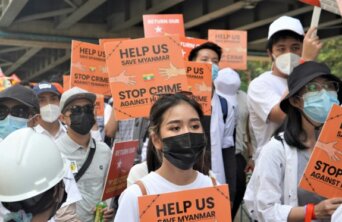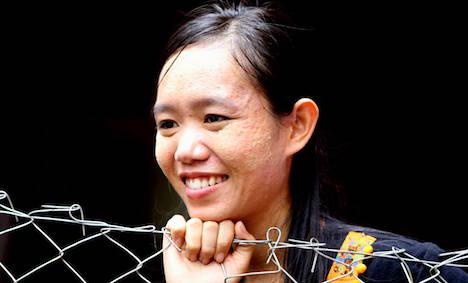- About
- Topics
- Story
- In-Depth
- Picks
- Opinion
- News
- Donate
- Signup for our newsletterOur Editors' Best Picks.Send
Read, Debate: Engage.
| topic: | Human Rights |
|---|---|
| located: | India, Myanmar |
| editor: | Sanjana Chawla |
The humanitarian crisis in Myanmar has unfolded with increasing severity as the military junta intensifies its crackdown on opposition forces and civilians, leading to widespread violence and displacement.
When the military usurped power in February 2021, it plunged Myanmar into chaos, employing brutal tactics, including the use of thermobaric bombs and airstrikes against civilians. These attacks have resulted in mass casualties, including children, and have been condemned as potential war crimes.
The pro-democracy movement in Myanmar remains resilient, with significant support from the majority Bamar population and various societal sectors, including monks and students. This collective resistance underscores a deep-seated yearning for democratic values and governance, challenging the military's authoritarian grip.
Humanitarian needs are escalating, with one-third of Myanmar's population requiring aid. Nearly 2 million people are internally displaced, and tens of thousands have sought refuge in neighbouring countries.
The military's blockade of humanitarian assistance, as part of its "four cuts" strategy, is a deliberate attempt to isolate and terrorise civilian populations, severely hampering aid efforts and exacerbating the suffering of millions. Towns and villages far from the front lines have not been spared, with airstrikes targeting civilian areas and causing devastating losses.
This indiscriminate violence underscores the junta's disregard for civilian life and international humanitarian law.
The crisis's regional implications are profound, affecting Myanmar's neighbours, mainly India. The conflict has disrupted cross-border trade, leading to shortages of essential goods and impacting regional economies, including India's. The instability threatens the immediate border areas and broader geopolitical and economic interests in the region.
This unfolding crisis directly impacts India. The influx of refugees fleeing the violence poses a significant challenge, straining resources and necessitating a nuanced policy response. Additionally, the instability threatens regional trade and economic interests, with disrupted cross-border commerce affecting local markets and livelihoods.
India faces a delicate balancing act, navigating its strategic interests, regional security concerns, and the imperative to uphold democratic values.
The human cost of this crisis remains staggering, with countless lives lost, communities shattered, and a nation's future hanging in the balance. The crisis in Myanmar underscores the need for a coherent regional strategy, emphasising diplomacy, humanitarian assistance, and support for democratic institutions.
The international community, including India, strives for solutions that uphold human dignity, foster stability, and promote democratic governance. The community's response has been a mix of condemnation and calls for humanitarian access, but on-the-ground realities present a grim picture of access blockages and escalating needs.
Many displaced individuals have nowhere to turn, face barriers to aid, and struggle for survival under dire conditions.
As Myanmar stands at a crossroads, the global response will be pivotal in shaping the country's trajectory, with implications for democracy, regional stability, and the fundamental human rights of its people. The Myanmar crisis challenges democracy and human rights and questions international commitment to humanitarian principles and democracy in a region with challenges.
Image by Saw Wunna.

